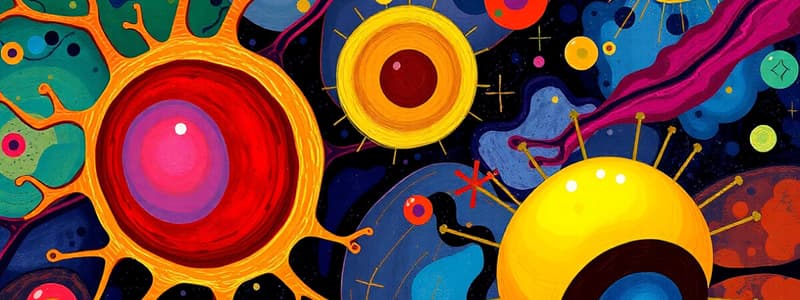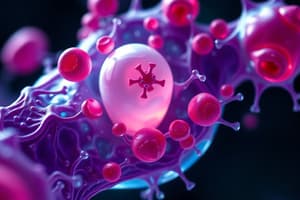Podcast
Questions and Answers
How does the oxidation of lipids compare to the oxidation of other substances like glucose, glycogen, and protein in terms of calorie yield?
How does the oxidation of lipids compare to the oxidation of other substances like glucose, glycogen, and protein in terms of calorie yield?
- Lipids yield more calories than glycogen but less than protein.
- Lipids yield fewer calories than glucose.
- Lipids yield approximately the same number of calories as proteins.
- Lipids yield the most calories compared to glucose, glycogen, and protein. (correct)
If a researcher is studying the synthesis and secretion of high-density lipoprotein (HDL), which organ should they focus on?
If a researcher is studying the synthesis and secretion of high-density lipoprotein (HDL), which organ should they focus on?
- Pancreas
- Muscle
- Kidney
- Liver (correct)
In cell fractionation experiments, which cellular component would require the highest centrifugal force to pellet due to its density?
In cell fractionation experiments, which cellular component would require the highest centrifugal force to pellet due to its density?
- Golgi apparatus
- Cytoplasm
- Nucleus (correct)
- Mitochondria
Considering the structure and function of cellular organelles, which of the following would occupy the largest volume within the cytoplasm?
Considering the structure and function of cellular organelles, which of the following would occupy the largest volume within the cytoplasm?
A cell is placed in an environment with a high concentration of a specific molecule. Which transport mechanism would allow the molecule to enter the cell?
A cell is placed in an environment with a high concentration of a specific molecule. Which transport mechanism would allow the molecule to enter the cell?
What is the inverse of osmosis?
What is the inverse of osmosis?
Which substance would be most effective at reducing the surface tension between fat droplets and the aqueous environment in the intestinal lumen?
Which substance would be most effective at reducing the surface tension between fat droplets and the aqueous environment in the intestinal lumen?
A researcher isolating enzymes from mitochondria identifies cytochrome oxidase, succinate dehydrogenase, and dihydrolipoyl dehydrogenase. What can be concluded about the enzymes?
A researcher isolating enzymes from mitochondria identifies cytochrome oxidase, succinate dehydrogenase, and dihydrolipoyl dehydrogenase. What can be concluded about the enzymes?
Where can the most active site of protein synthesis be found?
Where can the most active site of protein synthesis be found?
What mechanism facilitates the movement of fatty acids into and out of the mitochondria depending on cellular conditions?
What mechanism facilitates the movement of fatty acids into and out of the mitochondria depending on cellular conditions?
Flashcards
Which substance yields the most calories upon oxidation?
Which substance yields the most calories upon oxidation?
Lipids yield the most calories when oxidized in the body.
Where is HDL synthesized?
Where is HDL synthesized?
High-density lipoprotein (HDL) is synthesized and secreted from the liver.
Heaviest Particulate Component of Cell
Heaviest Particulate Component of Cell
The nucleus is the heaviest particulate component of the cell.
Largest Cytoplasmic Particulate
Largest Cytoplasmic Particulate
Signup and view all the flashcards
Material Exchange Methods
Material Exchange Methods
Signup and view all the flashcards
Opposite of Osmosis
Opposite of Osmosis
Signup and view all the flashcards
Decrease of Surface Tension in Intestinal Lumen
Decrease of Surface Tension in Intestinal Lumen
Signup and view all the flashcards
Mitochondria contents
Mitochondria contents
Signup and view all the flashcards
Most active site for protein synthesis
Most active site for protein synthesis
Signup and view all the flashcards
Mitochondrial DNA structure
Mitochondrial DNA structure
Signup and view all the flashcards
Study Notes
- Oxidation of lipids yields the most calories in the body.
- High-density lipoprotein is synthesized and secreted from the liver.
- The nucleus is the heaviest particulate component of the cell.
- The endoplasmic reticulum is the largest particulate of the cytoplasm.
- Exchange of material takes place by diffusion, active transport, and endocytosis.
- Osmosis is opposite to diffusion.
- Surface tension in the intestinal lumen between fat droplets and aqueous medium is decreased by bile salts.
- Cytochrome oxidase, succinate dehydrogenase, and dihydrolipoyl dehydrogenase are located in the mitochondria.
- The ribosome is the most active site of protein synthesis.
- Fatty acids can be transported into and out of mitochondria through active transport.
- Mitochondrial DNA is circular double-stranded.
- Carrier proteins can transport more than one substance, and exchange one substance for another.
- A lipid bilayer is permeable to urea.
- The Golgi complex forms glycoproteins.
- Viruses differ from prokaryotes and eukaryotes because they have no cells.
- The most important function of DNA in prokaryotes and eukaryotes is to serve as a repository for genetic information.
- Genetic information for living things is stored in DNA, also known as deoxyribonucleic acid.
- Passage of information from DNA to RNA is known as transcription.
- Hydrophilic substances are usually soluble in water or aqueous solutions such as the cell cytoplasm.
- Cell division and the movement of organelles within cells depend on a framework of protein filaments called cytoskeletons.
Studying That Suits You
Use AI to generate personalized quizzes and flashcards to suit your learning preferences.



